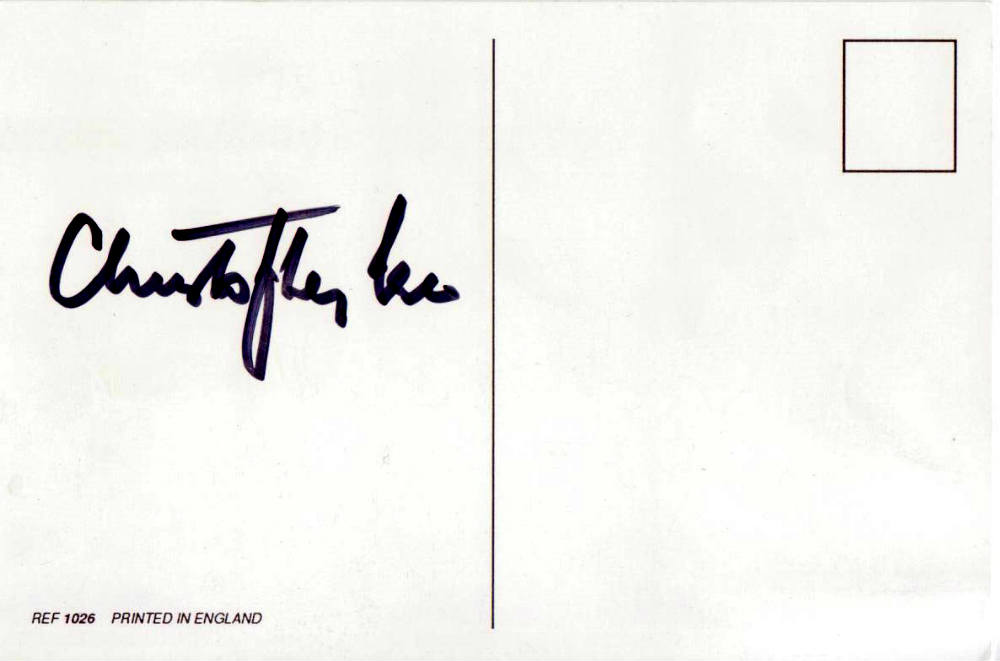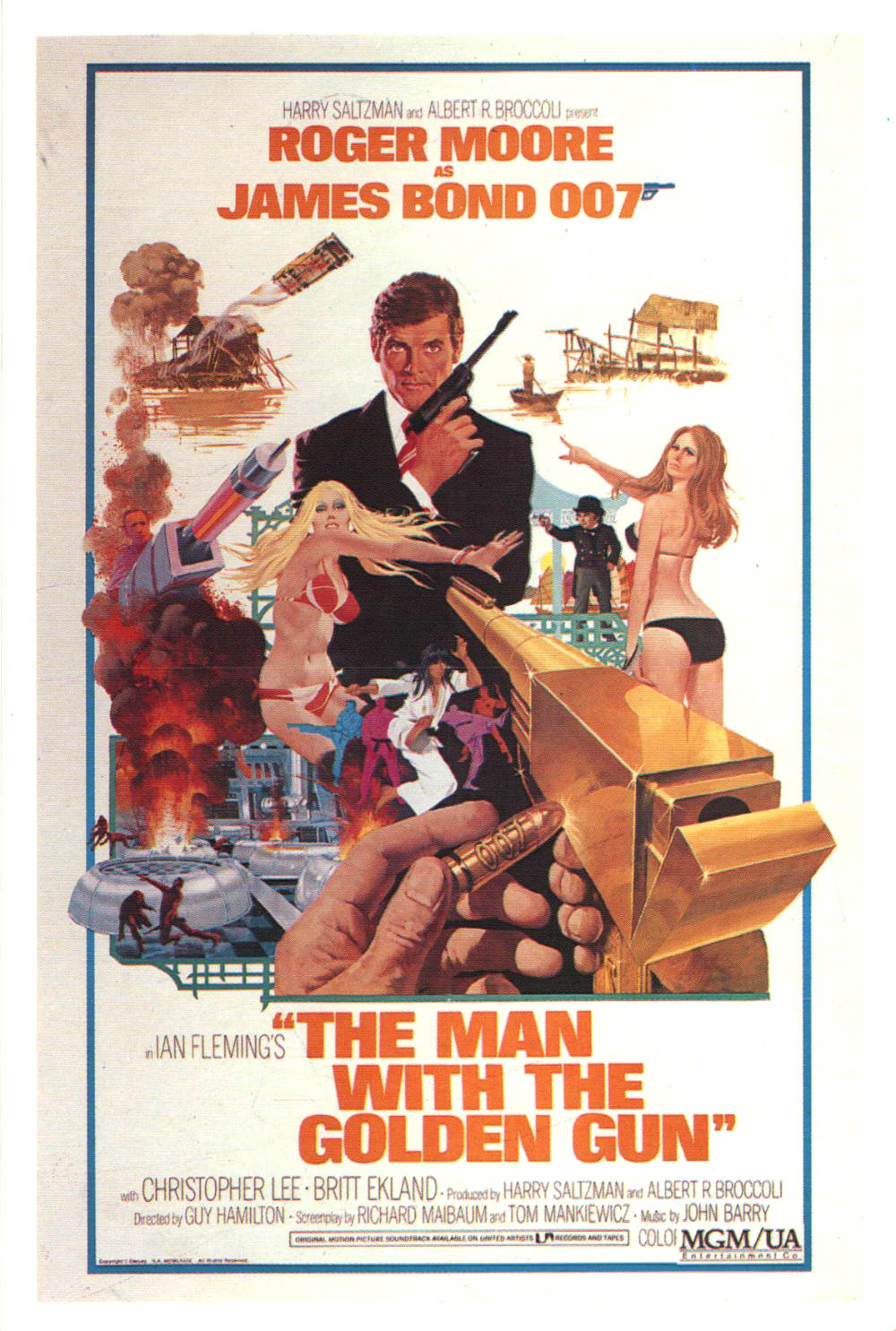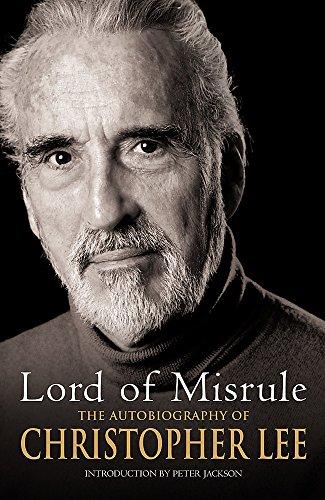Blandt de flere hundrede roller, Christopher Lee spillede i sin 70-årige karriere, var naturligvis Francisco Scaramanga i James Bond 007-filmen "Manden med den gyldne pistol" (The Man with the Golden Gun, EON 1974). Desuden var Christopher Lee stedfætter til James Bonds skaber, forfatteren Ian Fleming.

"My wife does not care for golf and she cannot hold a tune. All the same, without golf and music we should never have met. The chain of causes which led to my marriage began with my friend Lionel Stubbs. We often went round the course together, and even more often I dropped into his flat next door to chat about golf and what the RAF was up to. One evening Lionel had a Danish friend with him who like himself was 'in hides and skins'. When the topic of tanners and trappers had given out, the Dane and I discovered a common passion in music.
Harry Rabinowitz (namesake of the conductor) had an encyclopaedic knowledge of music – in fact he wrote an encyclopaedia. I cannot fathom the technicalities. If somebody talks about the magnificent bowing and fingerwork, it is lost on me. Triple tonguing and pedal work are closed books to me. But Harry was uncanny. He not only knew all that but he could recognize any singer and give you his name, the label on the record and its number. He'd published a catalogue of pre-electric recordings. I used to test him on obscure Romanian tenors and so forth. We sat for hours together, engrossed, and soon had a rapport so close that his Brooklyn-born wife Sandy ironically suggested we ought to get married.
I replied that there was no bar in my case, since I was single. They both stared at me as if they had thought I had a secret wife. 'You're not married?' they exclaimed in unison. Married people cannot bear anybody to remain in a single state. In no time they were snowing me with comments on a dazzling Dane they knew who was the one person in the world for me. She was twenty-five and they couldn't bear her being single either. Her name was Birgit Kroencke and everyone knew her as Gitte. She was a daughter of the director of the Tuborg brewery in Copenhagen. She was a painter. She was a model who'd worked for Balmain, Balenciaga and Dior. They showed me radiant pictures to prove it. The red hair, the green eyes, the feline elegance, all haunted me. I avowed a half-wish to meet this paragon.
Having softened me up, they busily snowed Gitte, telling her the one person in the world for her was dying to meet her, and extolled me as a noble kind genius. They showed her a non-Hammer photograph and she said indifferently, 'That's a reasonably normal-looking man,' and tried to get on with her life. They gave her my address and number in London and when she flew over for a dance told me I must wait in for her call. I did what I had never done for any woman - I gave up my golf that Sunday and waited by the phone. The call never came. I said loudly, 'That's that!' Then I added, 'I've finished with this woman and never want to meet her again.'

The romance was ended ended and I consoled myself by making quite a good picture in which I had a marvellous part as a night-club magician who blackmails a strangler [The Hands of Orlac, ed.] [...]
So that set me up in a good mood to take a holiday, and I opted for Christmas in Copenhagen with the Rabinowitzes. It was like some old melody when Sandy began wangling a drink with Gitte at the Angleterre. We both glumly agreed. I trailed along till I heard 'Hello' and there was a very beautiful girl in fur coat and hat. I thought, Oh, my God! She really, she truly, she actually is, a stunner. We all talked at once, and shut up at once, as in a film. Gitte and I got on a track of saying how little we each had wanted to meet the other, and I boringly went on about giving up golf that Sunday. She said, Well, I was told if ever we did meet, you'd either shoot me or ask me to marry you.'
I wasn't carrying a gun. I said nothing. After hearing about her experience of England with a miner's family in Barnsley and life in New York as a mannequin, I set up a row of invitations, whereby she lunched and dined with me without a break for the next three days. ln the second, over schnapps in her flat in the brewery, I said I couldn't live without her, asked her to be my mistress in London and, without giving her time to reply, topped it with an offer of marriage.
She gave no answer, but showed me some paintings she had made of New York. She was very entertaining, even about the German occupation when she was a child. She was never any respecter of persons. I kept on at her to marry me for the next couple of days. She said I should meet her father. This was encouraging, but alarming too when I recalled my Swedish engagement. But Richard Kroencke was utterly unperturbed. He only said jovially, 'You know, Gitte, I thought you were never going to be married!'
I rushed home to the Rabinowitzes and was delighted to find my mother's engagement ring was still in my cuffiinks box, where I'd shoved it after Henriette returned it. It looked none the worse for this cavalier treatment. That night the Rabinowitzes gave a dinner for six, the four of us plus Hans Raaschou and his wife, ideal guests since Hans was not only head of the Magasin du Nord, with a great esteem for models, but president of the Danish Golf Union. When Gitte showed the ring to Mie Raaschou in the girls' room that made the engagement public as well as official.
Gitte and I solemnized the momentous event by staying overnight together in her flat in the brewery. It was like a drunkard's dream. The refrigerator was crammed with beer. Wherever I looked the horizon was bounded by lagers. The flat was on the third floor and I had the illusion of being on a raft afloat on fifty fathoms of beer. We were woken from sleep by a thunderous crash on the window. To my horror I could see a man crouching on the window-sill. His features were contorted with rage and he banged furiously at the window. I had no idea who this human fly could be, until Gitte focused on him and said, 'This is ridiculous, it's Rosenqvist!'
Rosenqvist was a gnomelike janitor and handyman at the brewery who helped look after Richard Kroencke. My first reaction was that after all she had a nutty father, who had sent him to get me. 'Go away, Rosenqvist, go away!' shouted Gitte. But he wouldn't go away. He just hung there on a six inch ledge, a middle-aged man in overcoat and boots, looking very annoyed. Perhaps going away was not feasible. It was impossible to imagine how he had got there in the first place.
ln a towering state of indignation Gitte rose from our couch, assumed a robe and opened the window. In an equally transcendental state of rage Rosenqvist hurtled into the room. He yelled at her, 'You locked me out! I couldn't get in.' He was too het up to pay any attention to me, as I lay cowering with the sheet pulled up as far as my height would allow. He was almost weeping. 'I tried Herr Kroencke's room, but could not get in, so I had to come up the wall here.' Then he shrugged irritably and clumped off in a dudgeon.
Gitte's father thought it very funny and told everybody in Copenhagen.

With my previous experience of being engaged, I decided that this time it would not be for long. I had just one film to make first, and thought we could squeeze the marriage in between that and the really busy time that began in the spring. The date was set for 17 March 1961, a little before my thirty-ninth birthday.
In anticipation there were some Danish celebrations. We stayed at Nakkebølle Castle on Fyn, between Jutland and Zeeland, with Preben Philipsen, who named the biggest cinema distribution system in Germany after his father, Constantine. Every meal was wilder than the one before, and I woke every morning looking like potted death."
På side 343 i "Lord of Misrule" afkræfter Christopher Lee desuden det hårdnakkede rygte om, at han – der mestrede adskillige sprog – skulle have lært sig at tale sin hustrus danske tungemål. "Jeg forsøgte, men min selvtillid fortog sig, fordi hun altid sagde: 'Du lyder som en taxachauffør'.""Gitte and I have had our ruby wedding. We rarely dine out because, well, I prefer her Scandinavian cooking to the restaurants' menus. [...] I've never made a film in Danish, and couldn't master her language. I tried, but my confidence drained away because she always said, 'You sound like a taxi driver.'"
● Køb "Lord of Misrule" på amazon.co.uk
